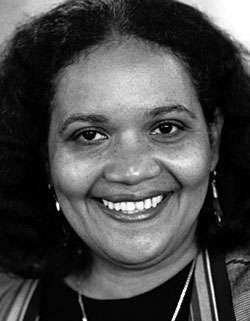|
The works of
contemporary Caribbean women writers display their
remarkable abilities of putting in play the myriad of
diverse cultural elements embedded in the cultural history
and contexts of the region. The rich heterogeneous
cultural toolkit they use makes their texts an ideal site
for tracking/locating the interactions between such
diverse elements. Lorna Goodison’s poem ‘Country
Sligoville’, published in the anthology Turn Thanks
(1999), presents a condensed instance of such interaction
as Caribbean traditions and icons are placed side-by-side
with Irish ones through evoking the figure of William
Butler Yeats.
Speaking of this poem,
Goodison talks of her Irish grandfather:
… I had an Irish great
grandfather. There is a great deal of Celtic influence in
Jamaica and the Caribbean. ‘Country Sligoville’ is a pun on
‘County Sligo’ in Ireland, because Jamaicans refer to rural
Jamaica as ‘country’, and there is a place called ‘Sligoville’
in Jamaica. Maybe my work is informed by many of the things
which also informed Yeats' work. I am deeply committed to a
place-Jamaica, its people and all aspects of its culture, and
things temporal and spiritual play important roles in the life
of Jamaicans. […] perhaps all I was attempting to say is that
these two cultures have things in common (Email Interview
2004: 2).
Indeed the cultural
similarities between the two ‘Sligos’ has prompted a recent
call for a ‘twinning’ of the two. In a ‘twin town’ initiative
Sligo’s namesake in Jamaica has been making an effort to
organise official visits and cultural exchange with Yeats’
county (‘Twinning Suitors 2007: 1). Incidentally, in 1996 a
plaque was laid by Jeremy Ulick Browne, the 11th Marquess of
Sligo, in commemoration of the abolition of slavery in Jamaica
- the emancipation having been initiated by his ancestor Peter
Browne (1)
Goodison’s ideas on Irish
lineage, recounted in more detail in her recent
autobiographical work
Harvey River
(2007), echo a general atmosphere of Irishness that permeates
Jamaica. This includes Irish place names such as Irish Town
and Dublin Castle in St. Andrew, Irish Pen and Sligoville in
St. Catherine, and Athenry and Bangor Ridge in Portland to
name but a few; added to this is a proliferation of typically
Irish surnames.
The capture of Spanish-held
Jamaica by the British took place in 1655. Irish men and women
were shipped to Barbados by Oliver Cromwell, followed by his
son Henry, through a system of forced labour akin to slavery.
From there an Irish workforce was forcibly brought to Jamaica.
The historical similarities
between how African and Irish people came to the Caribbean set
the scene for the cultural give-and-take performed by Lorna
Goodison in her poem. The towering figure of Yeats as a
canonical literary icon from the West is adorned with new
meaning engendered initially from a personal experience of the
poet:
…I began to write poetry
in response to my father's death. I was taught a great deal of
poetry in school, mostly the romantic poets, particularly
Wordsworth. As part of this teaching I was made to memorize
poems and I think I learned from early about the 'charm'
effect that some poems can have. My father died when I was
fifteen years old. I had no idea how to cope with such a
devastating loss, so I turned to poetry. I read widely in the
year following my father's death, from John Donne, George
Herbert and Rupert Brooke to Edna St. Vincent Millay and all
the poets in the Oxford Book of Modern Verse, edited by W.B.
Yeats. I believe that reading those poems helped me to deal
with my father's death. I believe that good poems all have
some 'medicine' in them, and I hope that my poems do
(Email Interview 2004: 1). |

